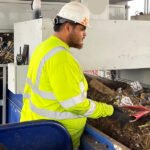Top: Reinvestment in recycling across the U.S. requires a stronger focus on material quality and higher labor standards. Photo courtesy of Eco-Cycle
Four of the original pioneers of mission-driven, community-based nonprofit recycling in the United States have joined together to launch AMBR, the Alliance of Mission-Based Recyclers. AMBR enters the current dialogue about the future of recycling “as a unified brain trust of seasoned, trustworthy, and transparent voices” for reclaiming a struggling national recycling industry from the waste crisis. The Alliance, according to a press release, is working to guide campaigns, policies, and infrastructure investments to advance credible, transparent recycling systems that serve as a bridge toward a circular economy and just, resilient, local communities.
“We launched AMBR to bring integrity back to the center of the recycling industry which has been co-opted by plastic manufacturers, brands, and garbage companies,” explains Lynn Hoffman, National Coordinator for AMBR and Co-President of Eureka Recycling. “Someone within the industry has to speak up for people and the planet with honesty and transparency.” AMBR is pushing to eliminate #3, #6 and #7 plastics as a tangible first step to get rid of the most problematic plastics. It also is developing a model local ordinance and other tools to help communities refocus their programs on the core recyclables and get rid of the most problematic ones.
AMBR’s founding members, who all share a zero waste-lens, are Eco-Cycle (Boulder, CO), Ecology Center (Berkeley, CA), Eureka Recycling (Minneapolis, MN), and Recycle Ann Arbor (Ann Arbor, MI). Individually, they operate some of the longest running programs in the nation founded on environmental, community development, and social justice missions. From their unique vantage point of the daily pile of collected recyclables, these organizations have been able to look “upstream” at how products could be redesigned to be more resource-efficient and more easily recyclable. They can also look “downstream” at how systems and infrastructure could better recover and remanufacture materials into new products. To shift practices both upstream and downstream, AMBR is working with consumer brands, packaging designers, the recycling industry, government leaders, media, and environmental movements. The Alliance also works within the US Plastics Pact to eliminate these and other problematic plastics industry-wide.
AMBR’s current first priority is to stem the tide of single-use plastic packaging waste. By reducing consumption and by raising manufacturing and recycling industry standards for the most problematic and unnecessary plastics, AMBR wants to flip the common idea that recycling needs to be “fixed” to accept all plastics. Instead, plastic packaging needs to be standardized, reduced, and redesigned to protect recycling. “We are not in a recycling crisis; we are in a packaging crisis,” says Kate Bailey, AMBR Policy Director and Eco-Cycle Policy and Research Director. “Effective recycling is one essential piece of the solution to that crisis, but recycling has to be done right to work, and it can’t fix out-of-control resource consumption and pollution on its own. Recycling operations must build transparency, prioritize material recovery, and advance equity for workers and local communities.”










